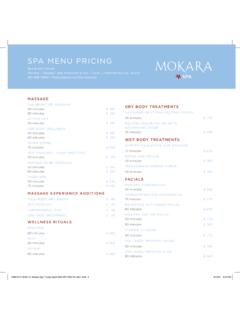Transcription of Exploitative pricing in the time of COVID - OECD
1 | 1 Exploitative pricing IN THE time OF COVID -19 OECD 2020 26 May 2020 One of the many consequences of the COVID -19 crisis is the disruption of supply chains. Together with increased demand, this has led to shortages in a number of essential products. These shortages are influencing the behaviour of firms and may have led to potentially Exploitative prices in some cases. Distinguishing legitimate from illegitimate pricing practices, as well as how best to deal with the latter, creates substantial challenges for competition authorities.
2 This note discusses these challenges and raises issues for discussion during a webinar meeting with competition authorities on 28 May 2020. It is part of a series of responses prepared by the OECD Competition Division to help guide the actions of governments and competition authorities as they react to the challenges presented by the COVID -19 pandemic. The brutal disruption caused by the pandemic has led to difficulties in the production and distribution of a number of essential products. This, in turn, creates opportunities for companies to significantly increase the prices of these products.
3 While price increases can reflect increases in the costs of market participants, and provide essential market signals to increase production and stimulate new entry, they can also reflect Exploitative business practices without objective justification. This latter type of conduct can justify intervention by competition authorities. This note focuses on how crises can lead to sudden price increases, and on the role that competition and public authorities will be expected to play in addressing them.
4 It reviews the challenges of bringing Exploitative pricing cases under competition law and analyses possible regulatory alternatives, while providing examples of past and current practice. Exploitative pricing in the time of COVID -19 2 | Exploitative pricing IN THE time OF COVID -19 OECD 2020 1. Economic crises, Exploitative pricing and competition law The brutal disruption caused by the pandemic has led to difficulties in the production and distribution of a number of essential products, which has in some cases led to shortages either because of increased demand ( face masks, hand sanitisers), insufficient production ( factories unable to open), or difficulties in product distribution due to confinement measures.
5 These supply and demand shocks may significantly influence how firms behave in markets for the supply of essential goods and services. Firms adjusting their strategies to these new market circumstances can explain most changes in their commercial behaviour. Nonetheless, some corporate conduct might require close scrutiny on the part of competition authorities. There are two main types of potentially problematic activities in this context arrangements with competitors and Exploitative practices, particularly Exploitative pricing .
6 The present note focuses on how crisis can lead to sudden price increases, and on the role that competition and public authorities will be expected to play in addressing them. Agreements in the context of the COVID -19 crisis will be addressed in another note. Companies may face significant disruptions in their inputs which can increase their costs, and concomitantly their prices. It is also natural for price rises to occur when demand increases and supply shortages take place.
7 This includes in public procurement where government s urgent demand for certain products ( face masks, protective gloves, ventilators, beds, medicines, intensive care material, COVID -19 tests, lab supplies and hospital infrastructure) has significantly increased in tandem with supply shortages. Price increases provide essential signals to increase production and stimulate new entry. Regardless of the reason for sudden price increases during the crisis, the public and politicians will expect, and perhaps pressure, competition authorities to intervene, and this may well be justified when firms engage in Exploitative behaviour without objective justification.
8 Some competition agencies are empowered to act directly against Exploitative pricing abuses under competition law. However, bringing excessive pricing cases is challenging even in normal times. Before bringing such cases, competition authorities should consider whether antitrust enforcement against high prices is needed, proportionate and effective. Agencies should also take into account whether alternatives such as consumer protection, price gouging rules or even price regulation are preferable.
9 Some competition authorities may have competence over these matters, while many do not. However, all competition authorities have the ability to pursue advocacy in favour of measures that protect consumers, while also ensuring that incentives remain in place for products to come into the market where and when needed. The present note is structured as follows. After describing the powers of competition authorities to challenge Exploitative pricing practices in general, section two considers whether and when competition authorities should bring such cases.
10 This section also describes the main challenges of bringing them in the context of the current health crisis focusing on the difficulties of establishing a dominant position and demonstrating that an abusive pricing conduct took place. Section three will then identify a number of options to ensure that enforcement against Exploitative practices is timely and effective, while section four looks at price regulation. The paper concludes with a number of principles that may guide competition authorities approach to Exploitative practices during this period.











